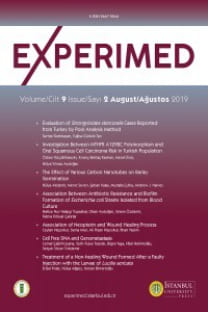Mmp-3 ve E-kaderin Polimorfizmlerinin Meme Tümörlerindeki Rolü
MMP-3, E-Kaderin, Matriks Metalloproteinaz, Polimorfizm, Meme Kanseri
___
- Hulpiaua P, Roy a F. Molecular evolution of the Cadherin superfamily, The International J BiochemCell Biol 2009;41:349-369.
- Güc D. Adezyon Molekülleri, Ankem Dergi 2004; 18(Ek2):158-163.
- Hazan RB, Qiao AR, Keren BR, Badano AI, Suyamaa K. Cadherin Switch in Tumor Progression, Ann NY Acad Sei 2004;1014: 155-163.
- Qureshi HS, Linden MD, Divine G, Raju UB. E- Cadherin Status in Breast Cancer Correlates With Histologic Type but Does Not Correlate With Established Prognostic Parameters, Am J Clin Pathol 2006;125:377-385
- Kowalski PJ, Rubin MA, Kleer CG. E-cadherin expression in primary carcinomas of the breast and its distant metastases, Breast Cancer Res 2003;5(6):R217-22.
- Beeghly-Fadiel A, Lu W, Gao YT, Long J, Deming SL, Cai Q, Zheng Y, Shu XO, Zheng W. E-cadherin polymorphisms and breast cancer susceptibility: a report from the Shanghai Breast Cancer Study, Breast Cancer Res Treat 2010; 121:445-452
- Singhai R, Patil VW, Jaiswal SR, Patil SD, Tayade MB, Patil AV. E-Cadherin as diagnostic biomarker in breast cancer, North Am J Med Sei 2011; 3: 227-233.
- Suciu C, Cimpean AM, Muresan AM, Izvernariu D, Raica M. E-cadherin expression in invasive breast cancer, Romanian Journal of Morphology and Embryology 2008, 49(4):517-523
- Angst BD, Marcozzi C, Magee A I . The Cadherin superfamily, J Cell Sei 2001; 114, 625-626.
- Berx G, Becker KF, Höfler H, van Roy F. Mutations of the Human E-Cadherin (CDH1) Gene, Hum Mutat 1998;12(4):226-37.
- L i LC, Chui RM, Sasaki M. A Single Nucleotide Polymorphism in the E-cadherin Gene promoter alters transcriptional activities, Cancer Res 2000;60:873-876.
- Ferre N, Camps J, Joven J. Lack of Association of the 1171 (5A) Allele of the MMP3 Promoter with Breast Cancer, Clin Chem 2002; 48:5.
- Amälinei C, Cäruntu ID, Giugcä SE, Bälan RA. Matrix metalloproteinases involvement in pathologic conditions, Romanian Journal of Morphology and Embryology 2010, 51(2):215-228.
- Wang GY, Lu CQ, Zhang RM, Hu XH, Luo ZW. The E-cadherin Gene Polymorphism 160C/A and Cancer Risk: A HuGE Review and Meta-Analysis of 26 Case-Control Studies, Am J Epidemiol 2008; 167 (1): 7-14.
- Li LC, Chui RM, Sasaki M, Nakajima K, Perinchery G, Au HC, Nojima D, Carroll P, Dahiya R. A Single Nucleotide Polymorphism in the E-cadherin Gene Promoter Alters Transcriptional Activities, Cancer Res 2000;60:873-876.
- Pecina-Slaus N. Tumor suppressor gene E-cadherin and its role in nOimal and malignant cells, Cancer Cell Int. 2003; 3: 17.
- Berx G, Van Roy F. The E-cadherin/catenin complex: an important gatekeeper in breast cancer tumorigenesis and malignant progression, Breast Cancer Res 2001; 3:289-293
- Cattaneo F, Venesio T, Molatore S, Russo A, Fiocca R, Frattini M, Scovassi AI, Ottini L, Bertario L, Ranzani GN. Functional Analysis and Case-control Study of -160C/A Polymorphism in the E-cadherin Gene Promoter: Association with Cancer Risk, Anticancer Research 2006; 26: 4627-4632
- Motovali-Bashi M, Hojati Z, Hajihosein S. The role of matrix metalloproteinase-3 functional 5A/6A promoter polymorphism in tumor cell progression and metastasis of breast cancer, IJB, 2008; 6:45-49.
- Ye S, Eriksson P, HamstenA, Kurkinen M, Humphries SE, Henney AM. Progression of Coronary Atherosclerosis Is Associated with a Common Genetic Variant of the Human Stromelysin-1 Promoter Which Results in Reduced Gene Expression, J Biol Chem 1996; 271(22):13055-60.
- Samnegard A, Silveira A, Lundman P, Boquist S, Odeberg J, Hulthe J, McPheat W, Tornvall P, Bergstrand L, Ericsson CG, Hamsten A, Eriksson P. Serum matrix metalloproteinase-3 concentration is influenced by MMP-3 - 1612 5 A/6 A promoter genotype and associated with myocardial infarction, J Intern Med 2005;258(5):411-9.
- Kohrmann A, Kammerer U, Kapp M, Dietl J, Anacker J. Expression of Matrixmetalloproteinases in primary human, BMC Cancer 2009; 9:188
- Doizer KJ, Mahon SM. Cancer Prevention, Detection and Control, A Nursing Perspective, Oncology Nursing Society Pittsburg, PA, 2002; 389-444.
- McPherson K, Steel CM, Dixon JM. ABC of breast diseases. Breast cancer epidemiology, risk factors, and genetics, BMJ 2000;321(7261): 624-628.
- Radisky ES, Radisky DC. Matrix Metalloproteinase- Induced Epithelial-Mesenchymal Transition in Breast Cancer, J Mammary Gland Biol Neoplasia 2010;15:201-212
- Tsukino H, Kuroda Y, Imai H, Nakao H, Qiu D, Komiya Y, Inatomi H, Hamasaki, T, Kohshi K, Osada Y, Katoh T. Lack of Evidence for the Association of E-Cadherin Gene Polymorphism with Increased Risk or Progression of Prostate Cancer, Urol Int 2004;72(3):203-7.
- Lo YL, Yu JC, Chen ST, Hsu GC, Mau YC, Yang SL, Wu PE, Shen CY. Breast cancer risk associated with genotypic polymorphism of the mitotic checkpoint genes: a multigenic study on cancer susceptibility, Carcinogenesis 2007; 28(5): 1079-1086.
- Ghilardi G, Biondi M L , Caputo M . A Single Nucleotide Polymorphism in the Matrix Metalloproteinase- 3 Promoter Enhances Breast Cancer Susceptibility, Clin Cancer Res 2002;8:3820-3823.
- Krippl P, Langsenlehner U, Renner W. The 5A/6A Polymorphism of the Matrix Metalloproteinase 3 Gene Promoter and Breast Cancer, Clin Cancer Res 2004;10:3518
- Yayın Aralığı: Yılda 3 Sayı
- Başlangıç: 2011
- Yayıncı: İstanbul Üniversitesi
MMP-3 VE E-KADERİN POLİMORFİZMLERİNİN MEME KANSERİNDEKİ ROLÜ
Nazlı TURAN, Arzu ERGEN, Soykan ARIKAN, İlhan YAYLIM, Turgay İSBİR
Ağustos-Aralık 2012 Tarihleri Arasında DATAE'de Tamamlanan Tez Projeleri
BEHÇET HASTALARINDA SWAP70 ANTİKORUNUN İNCELENMESİ
Elif UĞUREL, Aydın KARABULUT, Ahmet GÜL, Ali Osman GÜRE, Erdem TÜZÜN, Uğur ÖZBEK, Burçak VURAL
Kısa Süreli Belleğin Retansiyon Fazı Elektriksel Salınımlarının Analizi
İtır KAŞIKÇI, Ali BAYRAM, Basri ERDOĞAN, Tamer DEMİRALP
Metabolik Sendromda Deneysel Hayvan Modelleri
Metin Yusuf GELMEZ, Pınar KASAPOĞLU, Çağdaş Uğur ADAŞ, İlhan TAHRALI, Sema Bilgiç GAZİOĞLU, Aydın ÇEVİK, Günnur DENİZ
Deney Hayvanlarında Temel Uygulamalar
Murat KÜÇÜK, Aydın ÇEVİK, Rivae KALAYCI
Mmp-3 ve E-kaderin Polimorfizmlerinin Meme Tümörlerindeki Rolü
Nazlı TURAN, Arzu ERGEN, Soykan ARIKAN, İlhan YAYLIM, Turgay ISBİR
